Tole
Painting and French Folk Art
The name "tole painting" came from a process, Tôle Peinte, which the French utilised for
decorating tin or iron articles. Tinplate sheets of
iron or steel were dipped in molten tin or pewter (which is
an alloy
of tin and copper)
and these were then worked into the various objects such as cache
pots,
urns, platters, candlesticks, tea service, trays and other
small articles and accessories. The objects
were then japanned (imitation of oriental lacquer work from
Japan
and the Far East) with a varnish created using a mixture of
resins, spirits, gums and oils. Many
original pieces of Tôle
Peinte have been preserved and can be viewed in museums
and bought at antique auctions.
Tole painting
as we know it today is, simply, decorative painted tin, and "toleware",
which is a common term in the decorative painting circle,
is an American term
for tinware and tinplate.
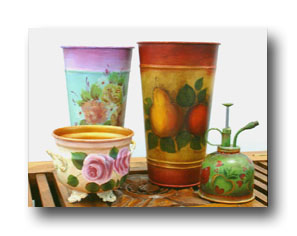
A group of projects on various metal
objects in the tradition of tole painting. Preserved tole
objects are truly pieces to admire - small trays, plates
and other items usually decorated with floral motifs and
either strokework or the classic French ribbon borders.
Pieces painted with these elements
had a uniquely "soft" look about them. Colours
commonly used were pastels. Sometimes they were painted on
crackled
backgrounds. Maritime
scenes and portraits were also quite common. France is also renowned
for "Quimper
faience",
a style of faience (the conventional
name in English for fine tin-glazed earthenware on a delicate
pale buff body) produced in a factory
near Quimper, in Brittany. Production started there in 1690 and
continues
to this day. Quimper faience initially featured rustic
blue on white designs on tin-glazed functional earthenware objects
including tiles, bowls, soup tureens, herb jars etc and was
traditionally painted with elements depicting French country
life.
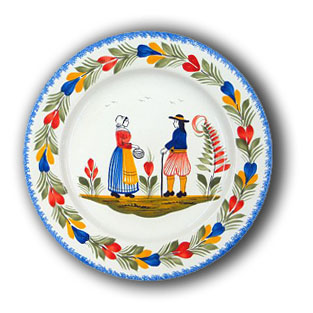
Through trade and travel, they soon
became influenced by the exotic floral designs of porcelain
from
the Far East in the 17th century. It became quite common then
to see Chinese motifs featuring pagodas, temples and oriental
country folk on French faience.
Chinoiserie is a generic French term referring to
an artistic style characterised by elaborate
decoration and intricate patterns of oriental or
Chinese influence.
European adaptation, in general, of oriental designs became
popular during the late 17th century French, Rococo and
Regency periods and Chinese-style ornamentation could be commonly
seen not only in faience but also wallpaper, fabric and most
importantly, furniture.
Motifs
commonly used
include caricatures, pagodas, landscapes, and rivers.
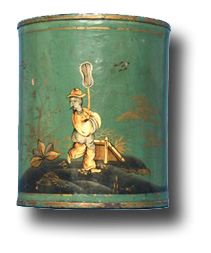
An antique Chinoiserie
bin. In decorative painting
today, motifs and elements common in French folk art
are commonly painted on wooden items and given glossy coats
of
varnish to imitate a porcelain or japanned look. 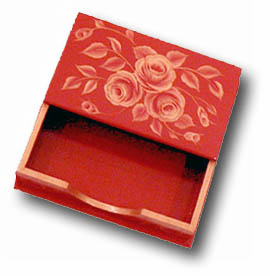
Gold roses on a rich burgundy background
imitating the Oriental look of Japanned lacquer. Also popular among decorative artists
today are hand painted signs and menu boards - these originated
in upmarket 19th century restaurants in Paris, as well as boulangeries (bakeries), boucheries
(butcheries) and delicatessens around France. They were
either made of tin or wood and naturally would utilise images
and elements that reflected the kind of establishment it was
hung at. 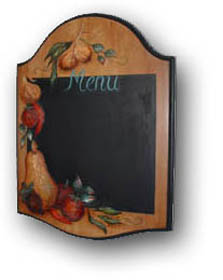
A menu board decorated
with textured vegetables - a conversation piece for guests! |